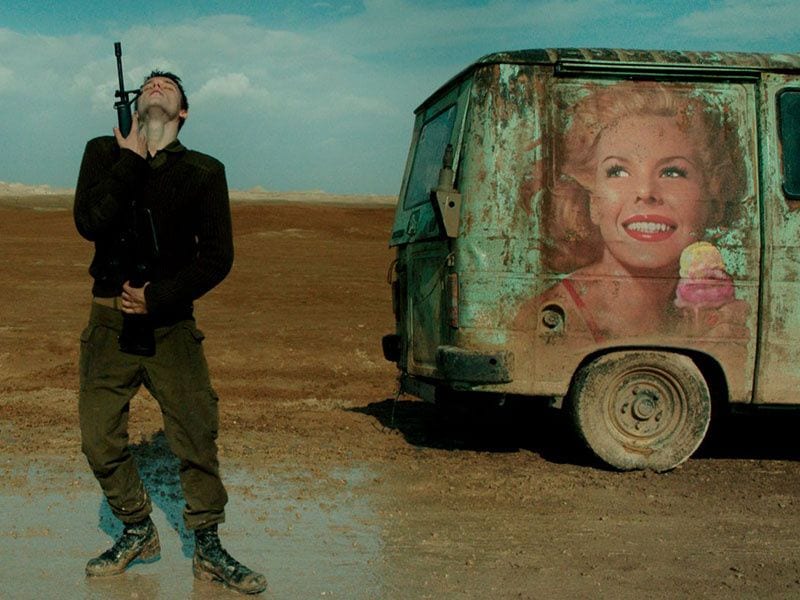There’s no rule that filmmakers need to have served in the military to make movies about war. Some of the greatest war movies were by directors who never spent a minute in basic (Coppola, Malick). Still, a little knowledge of the terrain helps. A filmmaker who has spent time hugging a rifle on watch understands things the civilian never can, no matter how much research they might do. With a director like Samuel Maoz, who was a tank gunner in the Israeli army and has only made two movies in eight years, his experience is critical.
A black comic Greek tragedy of pride, historical trauma, and happenstance, Foxtrot opens with no preamble in an apartment in Tel Aviv. The furnishings are tasteful and spare, the view spectacular, and the sadness devastating. A military team has just arrived to tell the couple who lives in this rarefied aerie that their son, a soldier, has died in the line of duty. The mother Dafna (Sarah Adler) faints dead away and is carried off to her bedroom. The father, Michael (Lior Ashkenazi) is too stunned to collapse. Nothing makes sense about what he has just learned. The more that the men from the army talk to him, the less sense it makes.
Maoz, who wrote and directed, shoots this sequence in tight closeup. Nearly all we see is Michael’s face, continually trembling on the verge of annihilating sadness before lurching back into disbelief and rage. A former soldier himself, he knows enough of the military’s unique ability to strangle logic with bureaucracy, not to immediately trust what he’s being told. The team moves through their protocols with the calm serenity that comes with routine. Michael hears them go on about the funeral arrangements and insist that he drink water each hour to not go into shock, but all he can think is that his son is dead for some certainly ridiculous reason.
Lior Ashkenazi in Fox Trot (IMDB)
Maoz keeps the tone flat and cool with Beckett-like rhythms until a surprise revelation undoes everything. The movie then pivots to where Michael and Dafna’s son Jonathan (Yonaton Shiray) has been doing his military service. He and a few other dead-tired IDF regulars wearing wrinkled fatigues and an air of terminal boredom are manning a checkpoint in the middle of a desert nowhere. If anything, this middle sequence is even more unreal than what preceded. There is almost no dialogue as the soldiers march back and forth from the roadblock to their miniature barrack, a rusted shipping container that is slowly sinking into the mud. Occasionally a car comes by and they make desultory checks before letting it through. Once, in a single shot held with admirably comical patience, a camel is allowed through unmolested.
There’s a heavy layer of irony here. Maoz contrasts the dirty and seemingly pointless reality of Jonathan’s daily duty and the higher calls to national service and patriotism proffered to Michael back in Tel Aviv. Maoz shoots the daily time-killing routine with a Jarmusch-like deadpan, the soldier dancing with his rifle, the nightly game of rolling a can in the barrack to see how much more it has subsided.
But there’s an uglier substrata beneath that simple-seeming commentary. Just witness the itchiness of the soldiers as each car approaches, the sleep-deprived emptiness in their eyes, the frozen terror of the civilians as they wait for the twitchy and bored boys with guns to send them on their way. Or not. By the time the middle sequence is ripped apart with violence, the eventual explosion that rends this movie apart again just as Dafna’s collapse and Michael’s disbelieving fury ripped it open at the start, feels all too foreseeable.
That intractable nature of tragedy and historical agony courses through Foxtrot like a minor but insistent chord. One generation’s pain passes down to the next, from Michael’s mother with her scars from the Holocaust to his own ugly memories of military service to Jonathan’s own desultory duty. Nobody escapes unscathed. Yet Maoz is also attuned to the farcical nature of how life during wartime can be as unexpectedly funny and shatteringly pointless as it is terror-prone. Many scenes, like the sloth-slow camel in the crossing to the army bulldozer burying evidence of a possible war crime, echo Catch-22 in how they unfold like dark daydreams that shatter into reality.
This mortality-shivered awareness is a common thread in movies from Israel, whose universal conscription laws and intimate contact with conflict zones have kept much of the public well-versed in the language of warfare. Witness the rambling dead-end comedy of Talya Lavie’s Zero Motivation, the dreamy surrealism of Ari Folman’s Waltz with Bashir, or the Sam Fuller-like scorched battlescape of Maoz’s debut Lebanon. There aren’t a lot of Private Ryans to be saved in these movies. In Foxtrot, the war-chased characters are just trying to survive with at least a sliver of their humanity intact.


